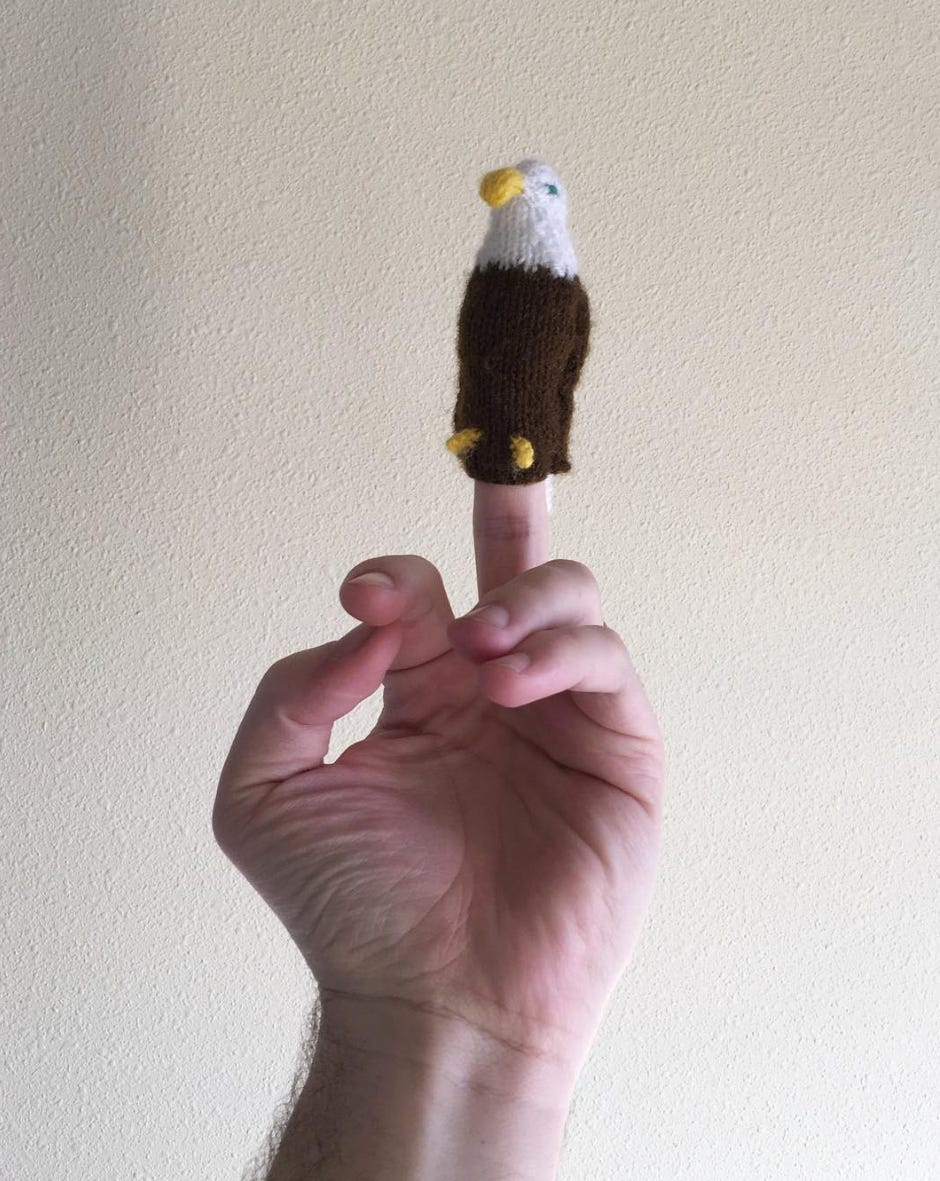This is Reading Photographs, a newsletter for those interested in remarkably mundane photographs and why the details, ideas, emotions, memories, connections and beliefs they arouse make them meaningful.
Satire is a kind of glass, wherein beholders do generally discover everybody's face but their own.
Jonathan Swift, The Battle of the Books (1704)
My apologies for this week’s newsletter being late.
***
I took this photo with my iPhone in 2017.
I was exhausted from parenting a toddler, exhausted from being in a new job and career field, exhausted by my years-long struggle with my mental health, exhausted at watching the unrepentant demagoguery and incompetence being inflicted upon people in the name of “making America great again.”
Yet I did not feel like I could articulate this exhaustion in writing, not coherently anyway.
Then one day I was visiting family friends with my wife and then only child. This finger puppet was among the detritus of toys that littered the sitting room floor as my daughter played with their daughter. I picked it up and turned it over in my hands, put it on one of my fingers. Then I looked into the front entryway where cold winter light streamed in from the decorative glass window in the front door.
I have never been particularly interested in staged or posed photography; photographing things as they are naturally, without my intervention, just seemed more…real to me, I guess? More honest? And yet, I knew exactly what kind of photo I wanted to take with this little finger puppet that I had chosen as an avatar of my view of my country. And I shared it with friends via social media and they “liked” it and this allegedly soothed my sorrow, shame and rage at the state of the world, convinced me that others agreed with me.
When the movie Starship Troopers came out in theaters in 1997, in, the director intentionally sought to use it as satire attacking the overt violence, fascism and hyper-militancy it’s source novel espoused, while also commenting on U.S. politics around gun control and capital punishment.
"If I tell the world that a right-wing, fascist way of doing things doesn't work, no one will listen to me. So I'm going to make a perfect fascist world: everyone is beautiful, everything is shiny, everything has big guns and fancy ships but it's only good for killing fucking Bugs!”
Paul Verhoeven
The movie flopped in the theaters and was panned by critics. Per a summary from Wikipedia:
Many reviewers did not interpret Starship Troopers as a satire and believed that its fascist themes were sincere. An editorial in The Washington Post described the film as pro-fascist, made, directed, and written by Nazis. Stephen Hunter said the film was "spiritually" and "psychologically" Nazi and born of a Nazi-like imagination. Hunter described it as a "perversion" of Erich Maria Remarque's 1929 novel, All Quiet on the Western Front, which portrays the physical and mental tolls of war, by glorifying the horrors of war. Others, such as Empire, argued that the "constant fetishizing of weaponry" and "[Aryan] cast", combined with the militaristic imagery in RoboCop and Total Recall, made it seem as though Verhoeven admired Heinlein's world more than he claimed. Some critics, such as Roger Ebert and Owen Gleiberman, recognized the satire, but often found that this commentary was indistinguishable from the promotion of the fascist utopia it was satirizing.
And now, I look back at my photo and realize how I made the same kind of mistake Verhoeven did. I wanted to portray their naked callousness, their embrace of atrocity, their disinterest in the impacts of their beliefs.
But the people I intended for this photograph to mock likely would see it as a compliment. They proudly wear t-shirts that say “fuck your feelings” or “don’t vote for the ho.” These are people who offer thoughts and prayers whenever there is a mass shooting. These are people who claim to be Christian and yet want to take away free school meals from children living in poverty.
And therein lies the weakness of satire: you cannot shame an audience that has none.






People see what they want to see and block out the rest. There's also this: some herds engender their own predators. We are now witnesses to how this happens.